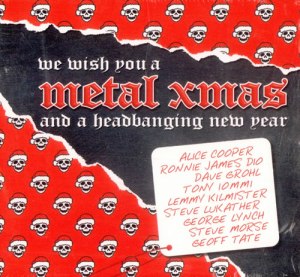I have a confession to make. I’m a Ratt fan.
Why is this a big deal? Keep reading…
As a young metalhead eager to see where the genre was headed as the NWOBHM phenomenon waned, I followed the thread of Metal’s evolution even as it seemed to split into two very disparate directions. One road led into the mainstream, and the more commercial brand of Metal that exploded in popularity after the success of Quiet Riot’s ‘Metal Health’ album; the other led to the underground and the burgeoning Thrash movement. For a while, I didn’t see the split, and was buying records on both sides of the divide. But as these two divergent directions solidified into two clearly definable musical sub-genres, it dawned on me that as the underground stuff got heavier, so did the commercial stuff grow more lightweight, more… safe. As the two styles quickly headed for opposite poles, I felt I had to choose a side.
At some point in 1984, I re-evaluated my record collection, and purged a bunch of records by bands that I decided had crossed the line, and no longer belonged in my collection: Dokken’s ‘Tooth and Nail’. Motley Crue’s ‘Shout at the Devil’. Quiet Riot’s CBS debut. Ratt’s first two major label releases: dumped. Once I realized where this new strain of Metal was headed, it was easy for me to kick these bands to the curb. This wasn’t real Metal! It wasn’t MINE. I was NOT the target audience for this music. What was I thinking? How did these records get into my collection? I felt like I had been tricked, duped, ripped off. I felt violated. I share all of this without exaggeration.
In strictly musical terms, ‘Pop Metal’ (the term ‘Hair Metal’ came much later) quickly solidified into a recognizable sub-genre with easily identifiable features: the throbbing single-note bass line, the gang vocal shout-outs, the glitter canon snare drums, the bag-of-tricks guitar solo… Lyrical content centered around women/sex, partying/rocking, and … well that’s about it. And, of course, the mandatory power ballad. All of these features were pretty easy to spot, and sure enough, I started to notice these elements creeping into the records some of my heroes were making…
It was true. Some of favorite bands were undergoing a shift in style, streamlining their sound by simplifying song structures, sweetening the backing vocals, adding keys… and generally sliding toward a faceless, generic sound that worked on the radio, but lacked authenticity or bite. So I also tossed some albums from some of my heroes, and simply stopped following others. It wasn’t easy, but the changes that some of these bands were making to their music felt like betrayal. Deciding where to draw the line was also difficult. In some cases the slide into commerciality was gradual, unfolding over two or three albums, without a clear delineation between authenticity and artificiality.
These were turbulent times, and these were not easy decisions. Walk with me now along the dividing line between the music I loved, and the music of compromise; the blurry border between truth and artifice, where the siren song of worldwide fame and fortune during Metal’s boom years led many a great band astray. You may have drawn that line in different places; you may not have drawn it at all. But here’s how I made my determinations during my Great Pop Metal Purge:
Rainbow
Departure Point: ‘Straight Between the Eyes’ (1982)
Red Flag: ‘Magic’ & ‘I Surrender’ from ‘Difficult to Cure’
Deal Breaker: ‘Stone Cold’
‘Stone Cold’ placed JLT-era Rainbow squarely into Foreigner territory. Rainbow’s foray into FM radio-friendly territory began with Russ Ballard’s ‘Since You’ve Been Gone’, and the JLT era began with the excellent ‘Jealous Lover’, but the ‘Difficult to Cure’ album was a mixed bag, and ‘Stone Cold’ was so bland that I passed on the ‘Eyes’ album altogether. This was before ‘Metal Health’ arrived and changed the landscape for the rest of the 80s, but it foreshadowed the issues I’d face the following year.
Re-Assessment: I did buy this record and its follow-up, ‘Bent Out of Shape’ later when Polydor made Rainbow’s catalog available on CD. Compared to the disappointments to come, my initial disapproval of Rainbow’s radio-friendly shift in direction seems kinda silly now, as these are solid records with some great songs and some very fine playing.
Def Leppard
Departure Point: ‘Pyromania’ (1983)
Red Flag: ‘Photograph’
Deal-breaker: The Full Mutt
When I first heard the Lep’s 1983 single, ‘Photograph’, it was over for me. I couldn’t believe these guys were making a mainstream move after only two records! This was not NWOBHM, it wasn’t even Metal, even by early 80’s standards. I chose not to purchase ‘Pyromania’. It was easy for me to dismiss this record as a sell-out, with records like fellow NWOBHM pioneers Iron Maiden’s monstrous ‘Piece of Mind’ available as a comparison point. Nonetheless, I bought ‘Pyro’, but only listened a few times; I never needed to put it on, as for almost two years it was inescapable.
Re-Assessment: Listening with today’s ears, the music on ‘Pyro’ sounds like a very natural progression from the ‘High n Dry’ album, but with a much more commercial sheen. I view it as a ‘crossover’ record, in that the Leps had thoroughly crossed over from NWOBHM to Pop Rock. In retrospect, this is probably a great record, but it’s just not my thing.
Saxon
Departure Point: ‘The Power and the Glory’ (1983)
Red Flag: Where’s Pete Gill?
Deal-breaker: New version of ‘Suzie Hold On’
Not another NWOBHM band pandering to the American market? Alas, ‘The Power and the Glory’ sounded different than any of Saxon’s earlier records, sporting a ‘bigger’, arena-ready sound. Gone was the scrappy NWOBHM sound we had known and loved; this was Saxon on steroids, ready to kick American ass. Beyond the cavernous production, the US version of ‘Power’ featured a beefed-up re-recording of the band’s 1980 single, ‘Suzie Hold On’. The song’s inclusion on US pressings bumped the more metallic ‘Midas Touch’, sacrificing some real heft to make room for a much more commercial song. This kind of needless fuckery was really starting to piss me off.
Re-Assessment: No doubt this album rocks hard, but I maintain that the huge leap in production values buries their scrappy old-school NWOBHM charm, and it still doesn’t sit right with me. Un-Saxon-like songs like ‘Nightmare’ and ‘The Eagle has Landed’ are ambitious and even somewhat successful, but give me the first four albums any day.
Blackfoot
Departure Point: ‘Siogo’ (1983)
Red Flag: Keyboards (Ken Hensley???)
Deal-breaker: ‘Send Me an Angel’
First JLT-era Rainbow starts sounding like Foreigner; then Blackfoot starts sounding like JLT-era Rainbow. Not what you wanna hear from Blackfoot, the most ass-kickin’-est southern axe slingers of the era. I played this record exactly once and could never bring myself to try it out again. I just found it disingenuous and flat out dull. Blackfoot had lost their balls. Looking for answers, I noticed that some outside writers were listed in the writing credits, which I thought might at least partially explain how BORING this record was, and um WHAT THE FUCK IS KEN HENSLEY DOING IN BLACKFOOT?
Re-Assessment: Well, I tried it out again. It was difficult to get through. I would rather hear an all-in Def Leppard sell their souls to Mutt Lange than an insincere, half-hearted, middle of the road exercise in compromise like ‘Siogo’. Honestly, find this kind of record deeply offensive.
Krokus
Departure Point: ‘The Blitz’ (1984)
Red Flag: The cover art
Deal-breaker: Everything
I never bought ‘The Blitz’; seeing/hearing the video for ‘Midnite Maniac’ sealed that deal. Coming directly after ‘Headhunter’, easily the most Metal album in the Krokus catalog, this pap was a real slap in the face. Krokus had reworked their look and sound, AGAIN, this time adopting all the requisite Pop-Metal tropes as perfectly as they had duplicated AC/DC’s sound just a few years earlier. After this move, Krokus stood revealed as shameless bandwagon jumpers… I forgave this band once already, for their unabashed AC/DC thievery, but not for this.
Re-Assessment: All frosting and no cake. The production is lightweight, the songs are tame, the cheesy radio-friendly cover of ‘Ballroom Blitz’ is nauseating, and the cover art is… Yuck. Krokus were always at their best when they sounded like Krokus. Pity they didn’t do more of that.
Y&T
Departure Point: ‘In Rock We Trust’ (1984)
Red Flag: That robot
Deal-breaker: That stupid fucking robot
This was a tough call. Y&T had always existed at the commercial edge of hard Rock and Metal; their best albums– ‘Earthshaker’ & ‘Black Tiger’– masterfully balanced their poppier inclinations with their more metallic edge. But for me, they crossed a line on ‘IRWT’, bringing in outside writers to sweeten the tunes, using some silly production tricks on ‘Lipstick and Leather’… Or maybe it was just one too many songs about Rock. My girlfriend loved this album… ‘Nuff said.
Re-Assessment: Decades later, this record really doesn’t sound that different from the few before it; it’s really just a matter of degree. There’s little too much sugar on top of this one for my taste. And that goddam robot…
Scorpions
Departure Point: ‘Love at First Sting’ (1984)
Red Flag: It was inevitable
Deal-breaker: Can’t quite put my finger on it…
Look, the Scorps INVENTED the power ballad, so I didn’t begrudge them the success of ‘No One Like You’ from ‘Blackout’; I think we all expected that, at some point, one of theirs would strike gold. ‘Still Loving You’ was a well-deserved victory lap, and as I cut ties, I wished them well. I just couldn’t hang to celebrate the Scorpions’ mainstream breakthrough, as I thought the rest of ‘Sting’ was severely lacking in that patented Scorpions …sting. I found the songs lame, the production tame, and the one balls-out rocker (‘The Same Thrill’) cliched and unconvincing. And is that even Herman Rarebell on the drums? I’m skeptical.The Scorps sounded spent here, after three scorchers in a row. Auf Wiedersehen, meine Freunde.
Re-Assessment: This isn’t the shameless sell-out that some other records I’m covering here are. Scorpions hadn’t changed their sound or style very much at all on ‘Sting’, they just took the next logical step on a journey they began a decade previous. I might actually re-buy this one. I said ‘might’.
Whitesnake
Departure Point: ‘Slide It In’ (1984)
Red Flag: Mickey Moody
Deal-breaker: John Sykes, Cozy Powell, and …Colin Hodgkinson?
When David Coverdale revamped Whitesnake, he fired Mickey Moody, the heart and soul of the band’s original Blues Rock sound, and replaced him with John Sykes, guitar masturbator extraordinaire. Cozy Powell also entered the mix, and while there’s no denying his place in the upper echelon of Rock/Metal drummers, I felt he was wrong for Whitesnake. I had pretty much decided to boycott this record based on those two changes alone; hearing that the album had been ‘remixed for the American market’ reinforced that decision. I’m not sure I even heard the entire record until it’s 35th anniversary edition was released…
Re-Assessment: I love this record. I bought the double-disc anniversary edition, which contains the UK & US mixes of the record, and I was blown away by an album I had written off without hearing. Of course, I prefer the original mix, as it leans a little more toward their classic Blues Rock sound, but Coverdale sounds great on both, the songs are strong throughout, and the real Hair bomb hadn’t hit yet.
Twisted Sister
Departure Point: ‘Stay Hungry’ (1985)
Red Flag: The cover art
Deal-breaker: The cartoonish videos
As Twisted Sister dived head first into the music video era, I bid them farewell. The image that the band chosen was ridiculous, and the videos were embarrassing cartoon garbage. None of this spoke to the music on the album, I know, but that’s where I was at the time: I was making qualitative judgments about albums based on non-musical factors. So I passed on ‘Stay Hungry’ on principle, even after I’d heard enough to be was pretty sure it was better than their previous record. Damn you, MTv!
Re-Assessment: This is actually a pretty worthy record; crunchy, punchy and aggressive. I still believe that the songs overall are better than the material on ‘You Can’t Stop Rock n Roll’, but even after all these years, I still can’t separate the music from the silly visuals stuck in my head due to the over-exposure of this record on MTv.
Loudness
Departure Point: ‘Thunder in the East’ (1985)
Red Flag: Signing to Atlantic Records
Deal-breaker: ‘M! Z! A!’
At this point, due to the mounting number of disappointing albums released by the old guard, I was dropping older bands from my fandom roster at the drop of a hat. Mistakes were made (see: Whitesnake). When I first heard the ‘Crazy Nights’ single from Loudness, I felt the same way I did when I had heard Scorpions’ ‘Rock You Like a Hurricane’: Ugh. Simple, safe, predictable, BORING. Loudness had apparently dumbed-down their music after signing with Atlantic and were in the big leagues now, clearly playing to the cheap seats. Unfortunately, I was getting used to cutting ties with bands I had loved for years, and it was getting easier.
Re-Assessment: Solid album. I bought this and the follow up, ‘Hurricane Eyes’, a few years back; both are worthy Loudness records. Kudos to these guys for not cashing in their chips completely while playing the major label game. I was wrong about ‘Thunder in the East’, a record more than worthy of your attention.
Van Halen
Departure Point: ‘5150’ (1986)
Red Flag: Sammy Hagar
Deal-breaker: ‘Why Can’t This Be Love’
Van Halen were, for a time, the most dangerous band on the planet. When Sammy joined, I assumed he wanted to get his Montrose mojo back, so hey, maybe this could work? Suddenly, Van Halen was fronted by a guy who could actually sing, but the result was obnoxious junk like ‘Why Can’t This Be Love’. I did not buy ‘5150’ based on my impression of that single alone. Diamond Dave’s presence and EVH’s guitar abstractions had (barely) saved the synth-heavy ‘1984’ and the paper-thin ‘Diver Down’ from total Pop disaster, but now Dave was gone and Ed had lightened and brightened his guitar tone, while continuing his annoying flirtation with keyboards. Dead to me.
Re-Assessment: I don’t think I have ever heard this album in it’s entirety until just now. Ed’s ‘new’ guitar sound just ruins it for me. And there’s just too much damn fun going on. All of the danger and edge that made Van Halen so badass is gone, and we’re left with a party band with funny haircuts and parachute pants. I hope I never hear another second of this record again.
Judas Priest
Departure Point: ‘Turbo’ (1986)
Red Flag: the cover art
Deal-breaker: ‘Turbo Lover’
This one still hurts. For many years, The Beast that is Priest was the living embodiment of the phrase Heavy Metal. Cutting my teeth on albums like ‘Sin After Sin’ and ‘Hell Bent for Leather’ made an album like ‘Turbo’ impossible for me to take. I had given them a pass on ‘Take These Chains’, and tried hard to like ‘Defenders of the Faith’ despite the over-processed production and lack of quality songs. But when I got about 60 seconds into ‘Turbo Lover’, I knew I could never be a fan of this band again. NOTE: 1986 was also the year of ‘Master of Puppets’, ‘Peace Sells…’, and ‘Reign in Blood’. After hearing ‘Turbo’, the road ahead was clear.
Re-Assessment: I’m just as disappointed today as I was 30+ years ago. No redeeming qualities at all. Just awful.
Aerosmith
Departure Point: ‘Permanent Vacation’ (1987)
Red Flag: Rehab
Deal-breaker: ‘Angel’
Wait— the band that wrote ‘Toys in the Attic’ and ‘Rocks’ needs to bring in outside writers? What the fuck for? So they can have huge hits like ‘Dude (Looks Like a Lady)’, and the wretched power ballad ‘Angel’, that’s why. Well, if this schlock was the result, then my hometown heroes would have to complete their career makeover without the likes of me. Oh, how I wanted these guys to recapture the dark magic of their first handful of records… I couldn’t have been the only kid who secretly wished these guys would start doing hard drugs again.
Re-Assessment: Not my Aerosmith. Props for surviving, but this almost sounds like parody to me. There are a few moments where the Aero boys almost catch fire, but if I were forced to include a post-rehab A-smith album into my collection, it would be ‘Pump’.
Accept
Departure Point: ‘Eat the Heat’ (1989)
Red Flag: Udo’s exit
Deal-breaker: Udo’s replacement
This record had no chance with me. Zero. Accept had replaced Udo Dirkschneider with an American singer, David Reece. I knew what it would sound like before I even heard it. I think I got a free promo copy of this on cassette, popped it into my car deck, listened in shock for a few songs, popped it out and into the trash. The music was vaguely recognizable as Accept, but as soon as the vox kicked in, this could’ve be any L.A. Glam Metal band with above-average chops and a misspelled name.
Re-Assessment: I can’t. I’m sorry. I tried. Unlistenable. Imagine Motorhead with Joe Lynne Turner on vocals; that is the schism we were presented with on ‘Eat the Heat’. Time has done nothing to make this epic mis-step more listenable.
Bonus Entries: In the interest of completeness, I also re-listened to the records that initially tipped me off to the faux Metal charade. Yes, I once owned these records. For a short time. Briefly. I think. Anyway, here are my current takes:
Quiet Riot / Metal Health (1983)
The Slade cover is brilliant. And that, my friends, is the best thing I can say about ‘Metal Health’. Actually, here’s something else: It’s better than ‘Shout at the Devil’, though that’s not saying much. After the reasonably metallic title track, and the brilliant Slade cover, the rest of this record is over-produced, under-written commercial Metal with a serious saccarine aftertaste. But could a record this crappy really be so influential? Yes, because when a record hits the #1 spot on the Billboard Hot 100, it immediately begins to influence the genre it operates within. Listening with fresh ears, I am struck by how this album set into place a strict template that most successful Pop Metal records that came after followed rigorously. A sub-genre is born?
Motley Crue / Shout at the Devil (1983)
Full Disclosure: I have come to believe that Motley Crue are the worst band in the history of music. But back in 1983, I thought the Motleys were OK enough, having been a big fan of at least one of their tunes: ‘Live Wire’ from their debut album. But listening today, ‘Shout’ feels strangely empty; It’s pretty plain to me that this record is packed wall-to-wall with filler. ‘Knock em Dead, Kid’ on Side Two is simply a re-write of ‘Looks That Kill’ from Side One, the album’s intro is a ‘Number of the Beast’ rip, and the Beatles cover sux. Oh, and the Satanic nonsense is just plain silly.
Dokken / Tooth and Nail (1984)
I bought the debut on Carerre in 1982, due to the buzz surrounding George Lynch, and I hoped ‘Tooth and Nail’ would be more and better. Well, the cover was better. In hindsight, though, this album is probably as good as a 100% certified Pop Metal album could be. Damning with faint praise? Okay, how about this: If your girlfriend popped this into the cassette deck on your way to the beach, you could do a lot worse. By the way, this guy is NOT a great singer. A stronger vocalist might have saved this record’s spot in my collection.
Ratt / Out of the Cellar (1984)
Ah yes; Ratt. I bought ‘Out of the Cellar’ based on my love for Ratt’s debut indie EP, and I liked the album a lot. I even saw them live on the tour supporting this record. But when I purged the Pop, I deemed the Ratt records to be part of the infection in my collection, and into the dumpster they went.
Since then, Ratt’s ‘Round and Round’ became one of the most persistent earworms I’d ever been inflicted with. It like a small section of my brain had been rewired to loop that song over and over (round and round?) forever and ever. Recently, it was suggested to me that the best way to remove an earworm was to listen to the offending song, so I did. I re-bought ‘Out of the Cellar’. And I had a blast revisiting this record. I love it! Somehow, Ratt had achieved the impossible, creating a record that exists simultaneously on both sides of the border I drew back in the 80s, with plenty of appeal for both true 80s metalheads and their Hair Metal counterparts. In my current collection, it sits comfortably alongside my Riot, Raven, and Rainbow albums.
And there you have it: A journey back through a difficult time. Lessons learned since then? Sure. Drawing such strict genre barriers when I was younger caused me to have to later re-buy several albums I had once decided were garbage; that was an eye-opener. Not to mention the countless hours of listening enjoyment I cost myself by being such a purist. I’m I’m happy to report that I’m a little more open-minded nowadays, but back in the 80s, this really was all a very big deal to me. And I couldn’t have been alone with all of that inner conflict… When and where did you draw the line? Did you draw one at all? And most importantly: Which side was Ratt on?






